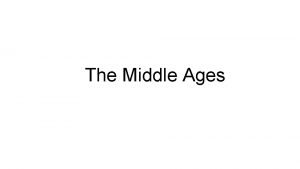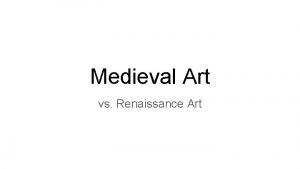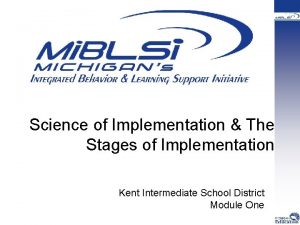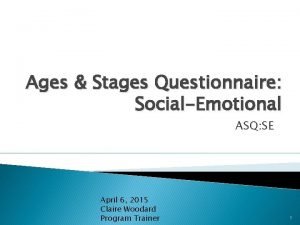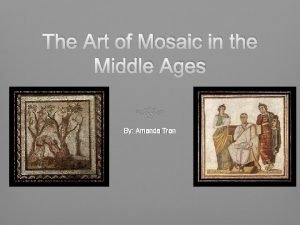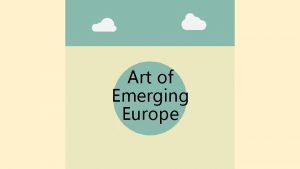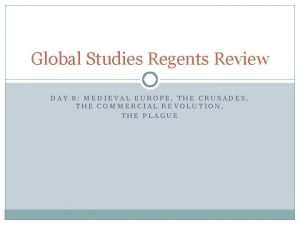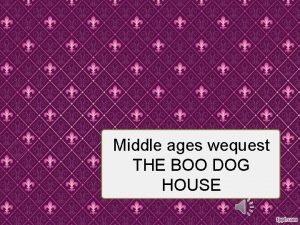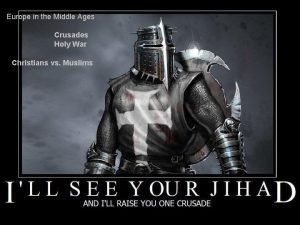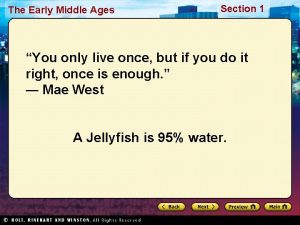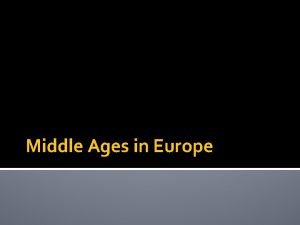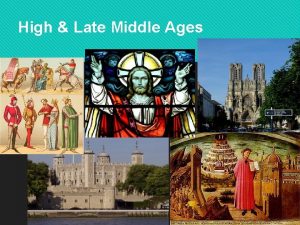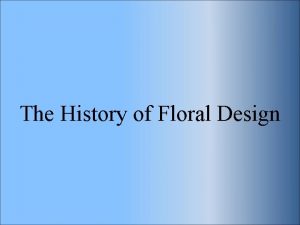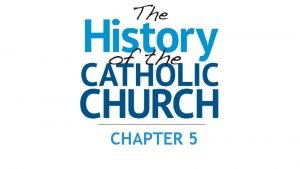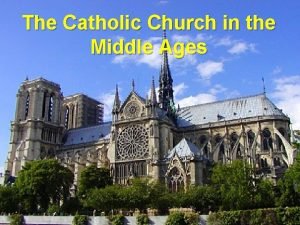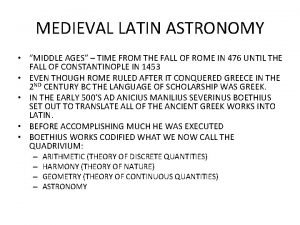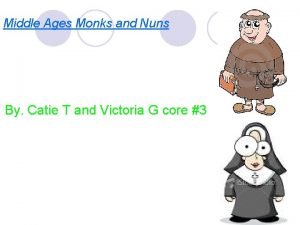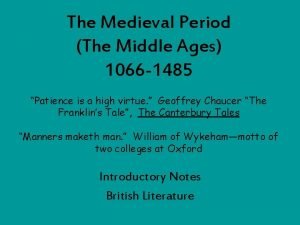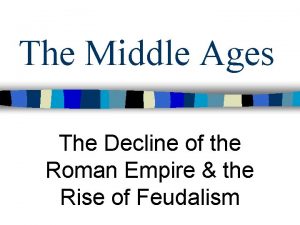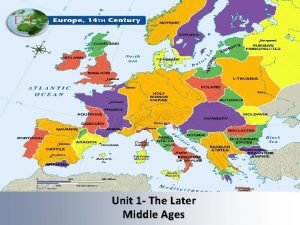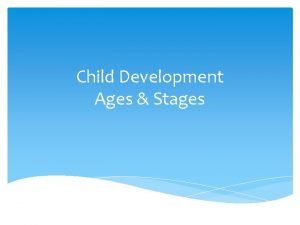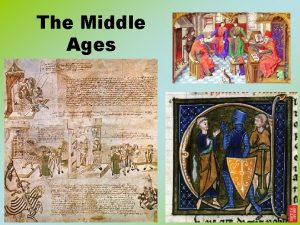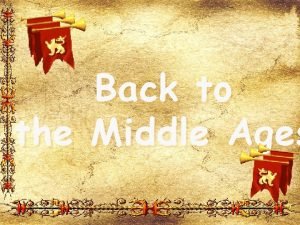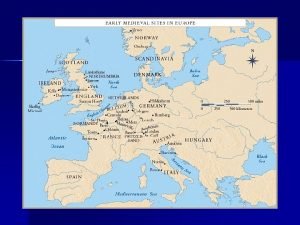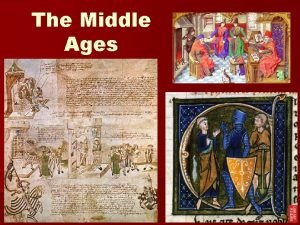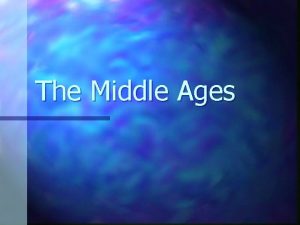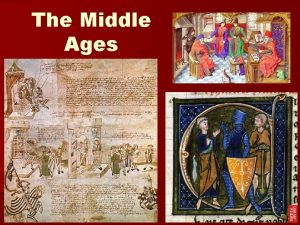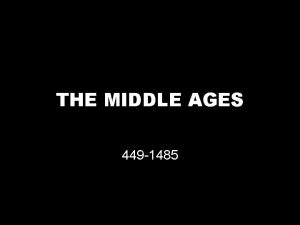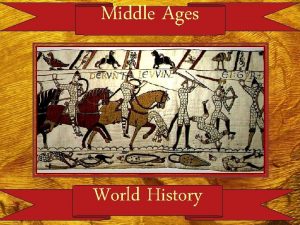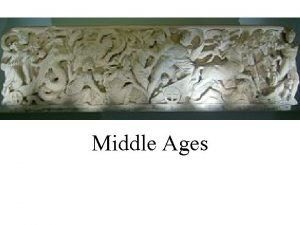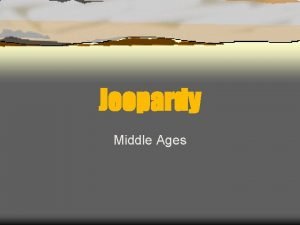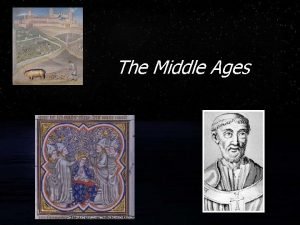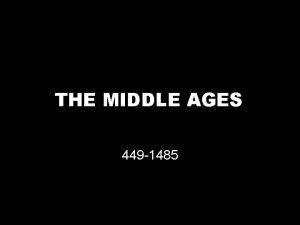The Middle Ages Stages of the Middle Ages






















- Slides: 22

The Middle Ages

Stages of the Middle Ages Early Middle Ages (c. 5001000) High Middle Ages (c. 10001300) Late Middle Ages (c. 13001500)

The Fall of the West Roman Empire • Beginning of the Middle Ages • Invasions • From Asia: Huns and Magyars • From the Germanic north: Saxons, Angles, and Goths • End of the Western Roman emperors

Rise of the Germanic Peoples • Ostrogoths: Italian peninsula • Visigoths: modernday Spain • Angles and Saxons: modern-day Britain • Franks: central Europe “Invasion of the Goths into the Roman Empire, ” a 19 th-century painting

Clovis (466– 511) • Established a Frankish kingdom in central Europe • Conquered many competing tribes and regional Roman political leaders • Converted to Christianity

Charlemagne (742– 814) • Powerful leader, strong Christian • Created the Carolingian Empire • Crowned by Pope Leo III as the first Holy Roman Emperor

The Vikings • Warrior culture from Scandinavia • Raided Europe • Established settlements throughout Europe and even in North America

Castles • Centres of noble life • Purposes: • Intimidation • Military defense • Residence

The Catholic Church Expands Its Power • The Church becomes more of a political entity • Struggles with monarchs • Gregory VII and Henry IV • Expanded land ownership Pope Gregory VII Henry IV of Germany

The Inquisition • New orders: Franciscans and Dominicans • The Inquisition: special court established by the Church to combat heresy • Accused heretics sometimes tortured • Convicted heretics burned at the stake A suspected heretic being tortured by the Inquisition

Universities • Need for administrators • Muslim knowledge, renewed interest in classical writings • Universitas Map of where medieval universities were located

France • • Hugh Capet (938– 996) Philip II (1180– 1222) Philip IV (1285– 1314) Most powerful kingdom in Europe by the 14 th century Hugh Capet

England • 1066: Norman Invasion • William the Conqueror (1027– 1087) • Brought feudalism to England • Henry II (1154– 1189) • Instituted a single common law code, unified court system William the Conqueror

Magna Carta (1215) • Conflict between King John and the English nobility • Nobles rebelled against excessive taxation, forced King John to sign the Magna Carta in 1215 • Limited power of the monarch • Formal recognition that the king was not above the law

Development of Parliament • Henry III (1216– 1272) • Edward I (1239– 1307) • Original parliament • House of Lords: nobles and church lords • House of Commons: knights and residents • Approved taxes, discussed policies, worked with the monarch to make laws Edward I

Islam in Europe • Islamic forces took control of Spain in the early 8 th century • Muslim innovations • Agriculture • Architecture • Math and Science Great Mosque of Córdoba

The Reconquista of Spain • Muslims ruled the Iberian Peninsula for nearly 800 years • Reconquista: Struggle between Christians and Muslims to control Spain • 718– 1492 • King Ferdinand of Aragon and Isabella of Castile Isabella and Ferdinand

The Crusades Louis IX of France leads crusaders against Damietta, in Egypt • 1095– 1291 • Goals of the Crusades: • Convert nonbelievers • Eliminate heretics • Regain control of the Holy Land from the Muslims

The Hundred Years’ War • The Hundred Years’ War: 1337– 1453 • Struggles between French and English royal families over who would rule either country • Conflicts over territory, trade English ruler Edward III

The Black Plague • Started in China • Reached Europe in 1347 via a merchant ship on the island of Sicily • 1347– 48: southern Europe • 1349– 50: central Europe and the British Isles • Killed 25– 30 million Europeans • Undermined faith in religion • Economy suffered • Culture influenced – “Ring Around the Rosie”

Architecture • Many churches and cathedrals built during the Middle Ages • Church designs • Romanesque: cross, nave • Gothic: ribbed vault, flying buttress, stained glass Chartres Cathedral in France, a prime example of medieval Gothic architecture

Legacy of the Middle Ages • Transitional period • New kingdoms evolved • The Church became a dominant force • Modern institutions originated
 Why are the middle ages called the dark ages
Why are the middle ages called the dark ages Dark ages vs middle ages
Dark ages vs middle ages Ages in stages kent
Ages in stages kent Asq ages and stages calculator
Asq ages and stages calculator Medieval period mosaic
Medieval period mosaic The middle ages outcome the power of the church
The middle ages outcome the power of the church Emerging europe art
Emerging europe art What were two indirect results of the crusades
What were two indirect results of the crusades During the middle ages noblewomen had
During the middle ages noblewomen had Middle ages
Middle ages Middle ages nobles
Middle ages nobles Middle ages def
Middle ages def High to late middle ages
High to late middle ages Ancient egyptian flower arrangements
Ancient egyptian flower arrangements Similarities between middle ages and renaissance
Similarities between middle ages and renaissance Middle ages
Middle ages Astronomy in the middle ages
Astronomy in the middle ages Middle ages
Middle ages Monks and nuns in the middle ages
Monks and nuns in the middle ages Late middle ages timeline
Late middle ages timeline Middle english period 1066 to 1485
Middle english period 1066 to 1485 Middle ages
Middle ages European middle ages map
European middle ages map
